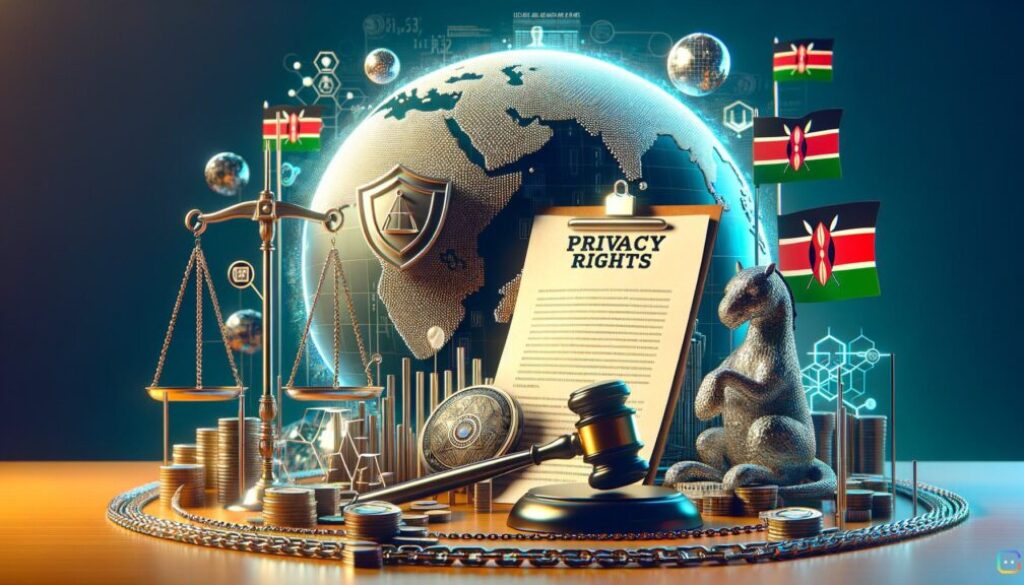Worldcoin’s Kenyan Setback: High Court Orders Data Deletion in Major Win for Privacy Rights

Worldcoin’s Kenyan Setback: High Court Orders Data Deletion in Major Win for Privacy Rights
Worldcoin, the ambitious cryptocurrency project aiming to create a global digital identity by scanning users’ irises, has faced a significant legal hurdle in Kenya. In a landmark decision, the Kenyan High Court ruled against Worldcoin’s data collection practices, ordering the company to cease processing and delete all biometric data collected from Kenyan citizens. This ruling is being hailed as a crucial victory for digital rights and privacy advocates in the country and potentially beyond.
Kenya Sounds the Alarm: Worldcoin’s Data Collection Halted
The case against Worldcoin was initiated by the Katiba Institute, a public interest organization, which raised serious concerns about the project’s methods of collecting sensitive biometric information, primarily through its “Orb” iris-scanning devices, often in exchange for Worldcoin’s WLD tokens.
The High Court’s Landmark Decision
Justice Roselyne Aburili of the Kenya High Court delivered the ruling, finding that Worldcoin’s operations violated Kenya’s Data Protection Act, 2019, and the constitutional right to privacy. The court has mandated a permanent halt to Worldcoin’s data collection activities in Kenya and ordered the deletion of all previously amassed biometric data from Kenyan users.
Key Violations Cited by the Court
The court highlighted several critical failings on Worldcoin’s part, including:
- Failure to Conduct a Data Protection Impact Assessment (DPIA): Worldcoin did not carry out a mandatory DPIA as required under Section 31 of Kenya’s Data Protection Act. A DPIA is crucial for identifying and mitigating risks associated with processing personal data, especially sensitive biometric data.
- Lack of Proper Consent: Concerns were raised about whether users provided informed consent for their iris scans, given the complexity of the project and the incentive of digital tokens.
- Data Security and Transfer: The methods and security surrounding the collection, storage, and potential transfer of highly sensitive biometric data were central to the legal challenge.
The “Orb” and Biometric Data Concerns
Worldcoin’s primary method of data collection involves individuals getting their irises scanned by a device called the “Orb.” In return, participants often received a quantity of WLD, Worldcoin’s cryptocurrency. Biometric data, such as iris scans, is unique and unchangeable, making its collection and storage a matter of significant privacy concern. The Office of the Data Protection Commissioner (ODPC) in Kenya will supervise the deletion process to ensure compliance with the court’s order.
A Ripple Effect? Global Scrutiny Intensifies for Worldcoin
The Kenyan ruling is not an isolated incident but rather part of a growing trend of global regulatory scrutiny aimed at Worldcoin’s operations. The project’s novel approach to digital identity and data collection has raised red flags for privacy watchdogs worldwide.
Regulatory Hurdles Across Continents
Several countries are examining or have taken action against Worldcoin:
- Indonesia: Authorities in Indonesia have suspended Worldcoin’s operations within the country, citing regulatory concerns similar to those raised elsewhere.
- Germany: The Bavarian State Office for Data Protection Supervision (BayLDA) has been investigating Worldcoin for compliance with the European Union’s General Data Protection Regulation (GDPR). They have ordered Worldcoin to delete non-compliant data, emphasizing the need for a lawful basis for processing such sensitive information and upholding data subject rights under GDPR.
- Other Nations: Regulators in numerous other countries, including France, Portugal, Spain, Hong Kong, Brazil, and South Korea, are also reportedly scrutinizing Worldcoin’s activities. This indicates a widespread concern among global authorities regarding the project’s impact on data privacy.
Market Tremors: WLD Token Feels the Heat
These legal and regulatory challenges have inevitably impacted Worldcoin’s native token, WLD. Following the news of the Kenyan High Court ruling, the value of WLD reportedly experienced a drop of around 10%. Such developments underscore the volatility within the cryptocurrency market and the influence of regulatory actions on token valuations. As is prudent in the dynamic crypto space, individuals are encouraged to conduct thorough research and understand the risks before making any financial decisions.
Navigating the Storm: Worldcoin’s Path Forward
Despite these significant setbacks, Worldcoin has indicated its commitment to its mission of creating a global financial and identity network. The project continues its expansion efforts in other regions, notably in the United States, where it is actively rolling out its Orb operations. The primary challenge for Worldcoin will be to navigate the complex web of international data protection laws and regain the trust of both users and regulators by demonstrating a robust commitment to privacy and security.
The Bigger Picture: Digital Identity, Privacy, and the Future
The Worldcoin saga, particularly the Kenyan High Court’s decision, brings to the forefront critical conversations about the future of digital identity, the ownership and control of personal biometric data, and the ethical considerations of exchanging such data for digital assets. It highlights the increasing importance of strong data protection frameworks and the responsibility of technology companies to operate transparently and ethically in the digital age.
As governments and regulatory bodies worldwide grapple with the rapid advancements in blockchain technology and digital identity solutions, cases like Worldcoin’s serve as important precedents. The Kenyan ruling is a clear signal that privacy rights are paramount and that innovative technologies must comply with established legal frameworks designed to protect individuals in an increasingly data-driven world. The journey for Worldcoin and similar projects will likely involve more rigorous oversight as the global community defines the boundaries of digital innovation and personal privacy.


